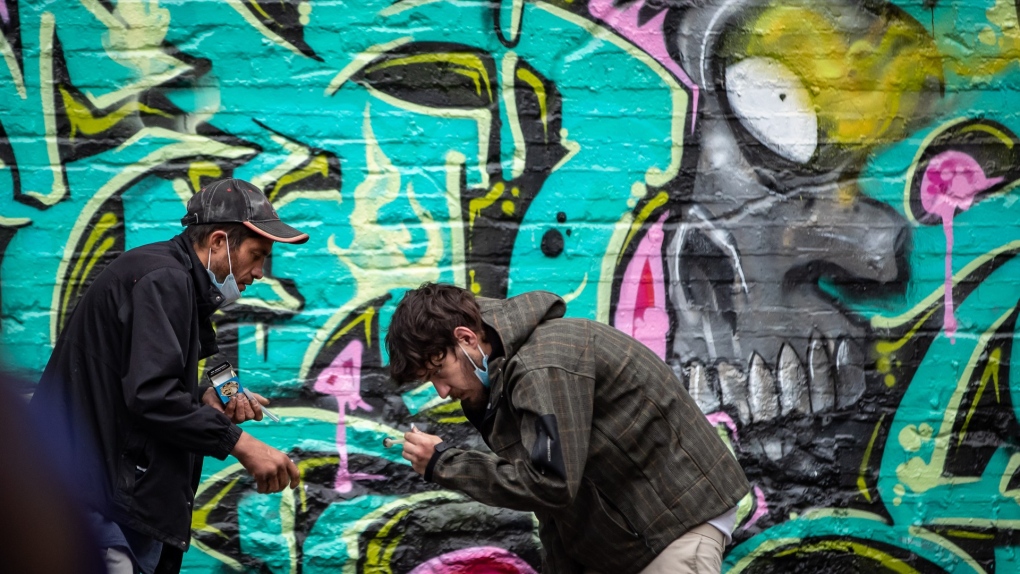Vancouver to consider 2-year pilot that would allow indoor smoking at supervised consumption sites
 Two men are seen at an outdoor supervised consumption site in the Downtown Eastside of Vancouver, on Thursday, May 27, 2021. THE CANADIAN PRESS/Darryl Dyck
Two men are seen at an outdoor supervised consumption site in the Downtown Eastside of Vancouver, on Thursday, May 27, 2021. THE CANADIAN PRESS/Darryl Dyck
To combat the toxic drug overdose crisis, Vancouver city staff are recommending that indoor smoking be allowed in supervised consumption sites.
Vancouver has four federally-approved spaces where services such as supervision for the inhalation, injection, oral and intranasal consumption of drugs are offered.
However, a city by-law banning indoor smoking means that supervised inhalation spaces must be outdoors—but staff say there’s a limited number of locations for these services.
“Staff believe that non-enforcement of the health by-law at a small number of supervised consumption sites can make an important contribution to life-saving efforts and serve as a pilot.”
The proposed pilot would last for two years, according to city staff, and will result in a report back to council no later than June 30, 2025.
One of Vancouver’s federally approved sites has already applied for a permits to build six indoor inhalation booths at 611 Powell St., where staff say no suitable outdoor options exist.
If council approves the recommendation, which is being tabled at the Standing Committee on Policy and Strategic Priorities meeting on May 31, staff will be able to approve the application.
The pilot project would not involve overdose prevention sites, which are provincially-approved and operated by local health authorities.
There are currently nine overdose prevention sites in Vancouver—two of which offer outdoor inhalation services.
Staff say the aim of their recommendation is to reduce harms and death from drug overdoses, and there are no financial implications associated with their plan.
The cost of not adopting more tools to address the toxic drug crisis, however, could be significant.
In the seven years since a public-health emergency was declared, the BC Coroners Service says at least 12,046 people across the province have died from toxic drug overdose.
Data from the BCCS shows that smoking was the most common way people who overdosed between 2017 and 2021 consumed their drugs.
“In 2021, smoking was the leading mode of consumption in all health services delivery area,” the BCCS wrote in a knowledge update last October.
CTVNews.ca Top Stories

B.C. tenants evicted for landlord's use after refusing large rent increase to take over neighbouring suite
Ashley Dickey and her mother rented part of the same Coquitlam duplex in three different decades under three different landlords.
Mountain guide dies after falling into a crevasse in Banff National Park
A man who fell into a crevasse while leading a backcountry ski group deep in the Canadian Rockies has died.
Expert warns of food consumption habits amid rising prices
A new survey by Dalhousie University's Agri-Food Analytics Lab asked Canadians about their food consumption habits amid rising prices.
MPP Sarah Jama asked to leave Ontario legislature for wearing keffiyeh
MPP Sarah Jama was asked to leave the Legislative Assembly of Ontario by House Speaker Ted Arnott on Thursday for wearing a keffiyeh, a garment which has been banned at Queen’s Park.
Charlie Woods, son of Tiger, shoots 81 in U.S. Open qualifier
Charlie Woods failed to advance in a U.S. Open local qualifying event Thursday, shooting a 9-over 81 at Legacy Golf & Tennis Club.
Ex-tabloid publisher testifies he scooped up possibly damaging tales to shield his old friend Trump
As Donald Trump was running for president in 2016, his old friend at the National Enquirer was scooping up potentially damaging stories about the candidate and paying out tens of thousands of dollars to keep them from the public eye.
Here's why provinces aren't following Saskatchewan's lead on the carbon tax home heating fight
After Prime Minister Justin Trudeau said the federal government would still send Canada Carbon Rebate cheques to Saskatchewan residents, despite Saskatchewan Premier Scott Moe's decision to stop collecting the carbon tax on natural gas or home heating, questions were raised about whether other provinces would follow suit. CTV News reached out across the country and here's what we found out.
Montreal actress calls Weinstein ruling 'discouraging' but not surprising
A Montreal actress, who has previously detailed incidents she had with disgraced Hollywood producer Harvey Weinstein, says a New York Court of Appeals decision overturning his 2020 rape conviction is 'discouraging' but not surprising.
Caleb Williams, Jayden Daniels and Drake Maye make it four NFL drafts with quarterbacks going 1-3
Caleb Williams is heading to the Windy City, aiming to become the franchise quarterback Chicago has sought for decades.

































